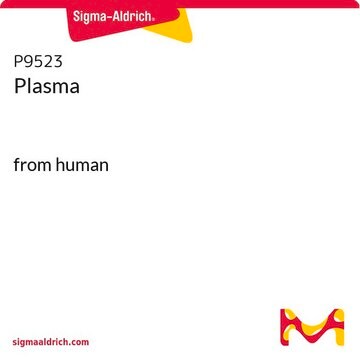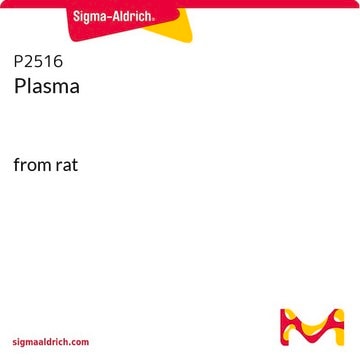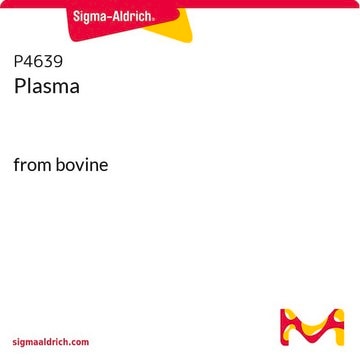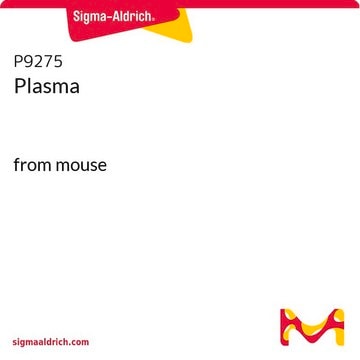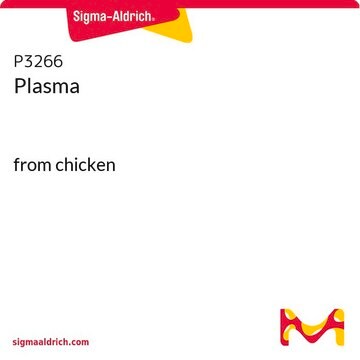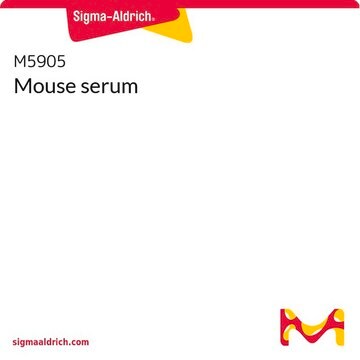Recommended Products
biological source
pig
Quality Level
form
powder
contains
3.8% trisodium citrate as anticoagulant
storage temp.
2-8°C
Looking for similar products? Visit Product Comparison Guide
General description
Plasma is the liquid part of the blood and lymphatic fluid, which makes up about half of its volume. Plasma is devoid of cells and, unlike serum, has not clotted. It is prepared from whole blood that is collected with anticoagulants (9:1) and centrifuged to remove cells and cellular debris. Some of the more common proteins found in plasma are albumin and prealbumin, α1-acid glycoprotein, transferrin, lipoproteins (HDL, LDL, and VLDL), immunoglobulins, complement proteins, and coagulation proteins (thrombin, plasminogin, and fibrinogen). Citrated plasma contains citrate (3.8% trisodium citrate) as an anticoagulant.
Plasma contains a variety of proteins with diverse functions. The primary functions of the plasma proteins include the maintenance of colloid osmotic pressure, pH, and electrolyte balance; the transport of metal ions, fatty acids, steroids, hormones, and drugs to various organs of the body; use as a source for amino acids for tissue nourishment; hemostasis and the prevention of thrombosis; the regulation of cellular activity and function through hormone signaling; and defense against invasion through the actions of antibodies and complement components.
Plasma contains a variety of proteins with diverse functions. The primary functions of the plasma proteins include the maintenance of colloid osmotic pressure, pH, and electrolyte balance; the transport of metal ions, fatty acids, steroids, hormones, and drugs to various organs of the body; use as a source for amino acids for tissue nourishment; hemostasis and the prevention of thrombosis; the regulation of cellular activity and function through hormone signaling; and defense against invasion through the actions of antibodies and complement components.
Application
Plasma was used as a negative control to analyze porcine immunoglobulins in diets and faeces, using a modified radial immunodiffusion method.
Other Notes
This product is prepared from pooled porcine blood. It contains 3.8% trisodium citrate as an anticoagulant. It is tested for clotting, which indicates that the clotting factors in the product are active. However, it is not analyzed to determine whether other enzymes present are native or denatured. The resulting plasma is 0.45 microm filtered and lyophilized from the indicated volume.
Preparation Note
Whole blood collected with anticoagulants (9:1), pooled, and centrifuged. The resulting plasma is 0.45 μm filtered and lyophilized from the indicated volumes.
Storage Class Code
11 - Combustible Solids
WGK
WGK 3
Flash Point(F)
Not applicable
Flash Point(C)
Not applicable
Certificates of Analysis (COA)
Search for Certificates of Analysis (COA) by entering the products Lot/Batch Number. Lot and Batch Numbers can be found on a product’s label following the words ‘Lot’ or ‘Batch’.
Already Own This Product?
Find documentation for the products that you have recently purchased in the Document Library.
Customers Also Viewed
Porcine immunoglobulins survival in the intestinal tract of adult dogs and cats fed dry food kibbles containing spray-dried porcine plasma (SDPP) or porcine immunoglobulin concentrate (PIC)
Rodriguez C, et al.
Korean journal for food science of animal resources, 139(3-4), 201-211 (2007)
Qian He et al.
Biosensors & bioelectronics, 154, 112068-112068 (2020-02-15)
Here we report the development of a high throughput, all-solution phase, and isothermal detection system for African Swine Fever Virus (ASFV). CRISPR-Cas12a programmed with a CRISPR RNA (crRNA) is used to detect ASFV target DNA. Upon ASFV DNA binding, the
Kumar Sachin Singh et al.
Nature, 589(7843), 597-602 (2020-12-29)
Isoprenoids are vital for all organisms, in which they maintain membrane stability and support core functions such as respiration1. IspH, an enzyme in the methyl erythritol phosphate pathway of isoprenoid synthesis, is essential for Gram-negative bacteria, mycobacteria and apicomplexans2,3. Its
A I Potapovich et al.
British journal of pharmacology, 158(5), 1236-1247 (2009-09-30)
The immunomodulatory effects of alpha-fetoprotein (AFP) on lymphocytes and macrophages have been described in vitro and in vivo. Recombinant forms of human AFP have been proposed as potential therapeutic entities for the treatment of autoimmune diseases. We examined the effects
Our team of scientists has experience in all areas of research including Life Science, Material Science, Chemical Synthesis, Chromatography, Analytical and many others.
Contact Technical Service